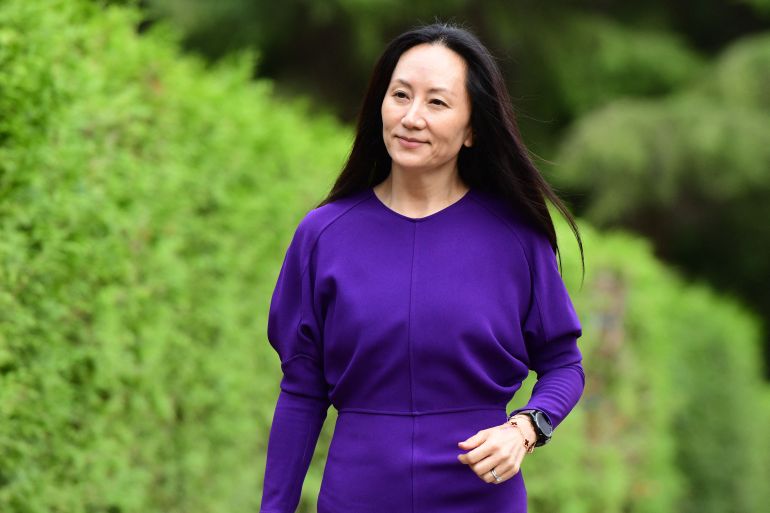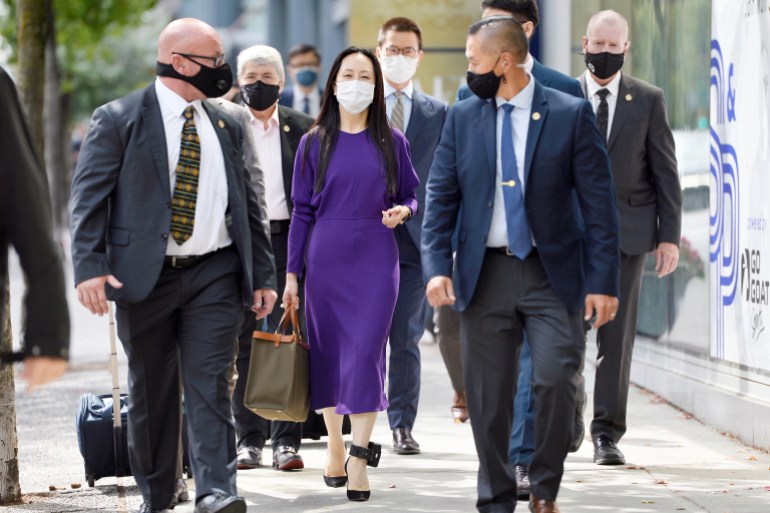Extradition hearings in Canada for Huawei’s Meng come to a close
Meng was detained on a US request in December 2018, with China arresting two Canadians just days later.

Huawei executive Meng Wanzhou’s fight in a Canadian court against extradition to the United States to face fraud and conspiracy charges has wrapped up after nearly 1,000 days of testimony.
The chief financial officer of the Chinese telecom giant is accused of defrauding HSBC Bank by falsely misrepresenting links between Huawei and Skycom, a subsidiary that sold telecoms equipment to Iran.
Keep reading
list of 4 itemsMeng Wanzhou’s extradition hearing enters final round in Canada
Huawei CFO case: Judge rejects Meng’s request to nix security
Meng defence lawyer accuses Canadian police officer of ‘cover-up’
The US Justice Department says Meng’s actions put the bank at risk of violating US sanctions, as it continued to clear US dollar transactions for Huawei.
Supreme Court of British Columbia Associate Chief Justice Heather Holmes says she expects to set a date to deliver her decision on October 21 after the case was closed on Wednesday.
Meng’s arrest in December 2018 during a stopover in Vancouver triggered a sharp deterioration in relations between Canada and China. Just a few days later China detained two Canadian men – businessman Michael Spavor and former diplomat Michael Kovrig – in what Western countries have condemned as “hostage diplomacy”.
Meng, 49, is living in a Vancouver mansion on bail conditions that include a curfew and electronic monitoring, as she awaits the outcome of the extradition proceedings. The two Canadians, meanwhile, have been held virtually incommunicado with limited access allowed for consular officials. Both men were put on trial in March with diplomats denied access to them.
Last week, as the final arguments in Meng’s case got under way, a Chinese court found Spavor guilty of espionage and sentenced him to 11 years in jail. Kovrig, who was tried a few days after his compatriot, is still awaiting a verdict.
Meng has claimed innocence and her lawyers have rejected the US allegations against her.
The defence fails “on the facts and they fail on the law. You should have no difficulty finding dishonesty sufficient to make … a case for fraud,” Canadian government prosecutor Robert Frater told the court.
“No one has received a fairer extradition hearing in this country than Ms Meng,” he added.

Meng’s lawyers have argued that her extradition should be stayed because the US misled Canada when it summarised the evidence against her, that former President Donald Trump’s comments on her case poisoned any trial she might face, and that no real fraud took place, among other reasons.
Canadian prosecutors have maintained that the United States has a valid case and emphasised that the bar for extradition is low.
Associate Chief Justice Holmes only needs to find that there is sufficient evidence to go to trial to allow the extradition.
If transferred to the US for trial and subsequently convicted, Meng, the daughter of Huawei’s founder, could face more than 30 years in prison.
Key to the US case is a PowerPoint presentation Meng made to HSBC executives in a meeting at a Hong Kong tea house in 2013 that was intended to reassure them that Huawei was not engaged in activities that could cause HSBC to run afoul of US sanctions law, following reports to the contrary.
Frater said Meng’s presentation was “blatantly misleading” for not disclosing the true nature of the relationship between Huawei and Skycom, calling their business relationship “controllable” but obscuring that the two companies were one and the same.
“You should have no difficulty finding dishonesty sufficient to make a prima facie case of fraud,” he told the extradition judge.
If Holmes rules in favour of extradition, the final decision will then be made by Canada’s justice minister.
Both decisions can be appealed by Meng’s legal team, which could mean the case drags on for years.